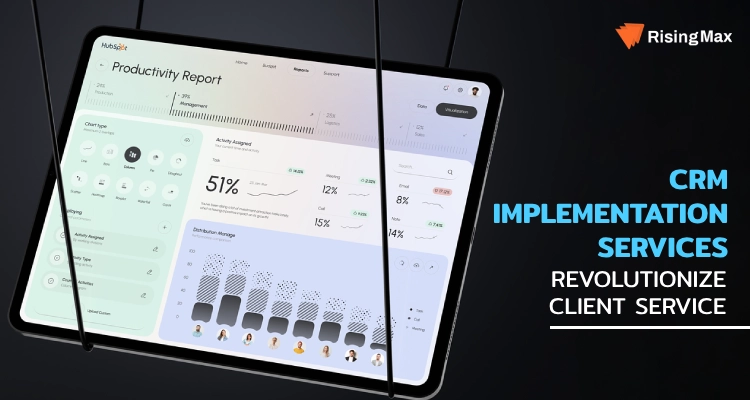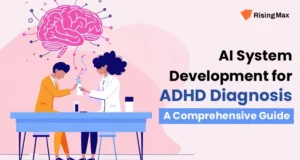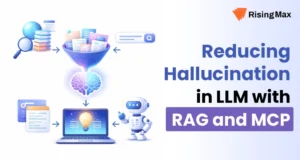CRM Implementation Services integrates customer relationship management (CRM) software into an organization’s operations. This involves deploying the CRM system, configuring it to meet specific business needs, and training users to use its features effectively. In this blog, we will explore the world of CRM implementation in-depth, covering everything from the benefits and challenges to best practices and tips for success. The global custom CRM (Customer Relationship Management) software market is estimated to grow to 49.6 billion USD by 2025.
CRM Implementation Services integrates customer relationship (CRM) software into an organization’s operations. It includes deploying the CRM system, configuring it to meet specific business requirements, and training users to use its features effectively. Implementing a CRM system is a tremendous value-adding process that substantially benefits any business. It involves selecting, installing, and using CRM software to track and manage an organization’s hierarchy with its current potential customers.
Let’s discuss the CRM implementation process and how CRM implementation services can help revolutionize your client service.
Looking to build your Custom CRM platform from scratch?
Find out how a modern CRM App development agency can benefit your business! Talk to our CRM implementation specialists now.
CRM lifecycle: How It Works?
The CRM lifecycle is a procedure that refers to the stages a given customer moves through and how your company approaches managing the customer-brand relationship based on their stage.
There are 5 critical stages in the typical CRM life cycle model involves:
- Reach
- Acquisition
- Conversion
- Retention
- Loyalty
Marketing is required for building reach (running ads and distributing content to potential customers). It works closely with the sales team during acquisition.
From there, sales nurtures the relationship through to the conversion stage (where the lead becomes a customer) and then hands the customer over to the service and success teams to continue growing that relationship.
From there, sales nourish the bonds through to the conversion stage (where the lead becomes a customer) and then hands the customer over to the service and success teams to continue growing those relationships.
Their goal is to keep the users on board ( through customer retention and customer satisfaction initiatives) and delight them so much that they may refer friends, family, or colleagues ( which we can consider the loyalty stage of the life cycle).
Process Of Implementing CRM Software Into Your Business
CRM system implementation will be a core resource for your business as it grows, so it must be implemented carefully. Allowing plenty of time for the process will ensure your team makes the most of its ability to automate your sales and customer service functions.
Step 1: Analyze Goals and Processes
As you research the wide variety of CRMs on the market, it’s easy to get excited about all the features and integrations they offer. The only features that matter are the ones that are a good fit for your objectives. Before you start searching the market, reviewing what you want from a platform above contact management is a good idea. Consider how a CRM can help your business meet goals and overcome challenges. Why are you considering a new system?
- Are you expecting to help your sales team nurture leads?
- Do you want to improve the support you offer to customers?
- Will a CRM save time on administrative functions?
- Customization: Can the platform be adjusted with elements like custom fields and filters to your needs?
- Workflows: Will it support a consistent client record across multiple stages of work? An integrated CRM is ideal for uniting the client journey.
- Pricing: Is the CRM within your budget? Remember to consider whether it will replace any new or underutilized software.
- Integrations: Does the platform integrate with your other essential tools to help you build seamless, efficient processes?
Step 3: Get Implementation Support
While it may be tempting to roll out a CRM with just your internal resources, it’s important to remember that your team’s talents are best utilized in client work, not in the burden of software implementation. By seeking expert help, you can relieve them of this additional responsibility, showing that you value their skills and time and reducing their stress levels. This investment in expert help is a wise decision when dealing with a change of this magnitude.
A great CRM will offer an implementation program to guide you through migration, setup, and training and address your change management concerns. Take inspiration from one agency that succeeded in implementing Accelo with a partnership approach. Their success story can give you hope and confidence in your CRM implementation journey.
Step 4: Train Your Team
Learning a new system is always tricky, some team members are more inclined to accept change than others. That’s why it’s essential to communicate with your organization about the impending change and reassure them that you’ll provide the resources they need to incorporate this new technology into their day-to-day. With the help of the platform’s implementation team, create a standardized plan that you can adapt for those who need to be more tech-savvy. Additionally, for less tech-savvy employees, consider integrating mentorship programs that provide personalized support and skill development, helping them easily adapt to the new system.
Step 5: Test and Plan for Going Live
Even with guidance, you can encounter problems and unanticipated scope creep. It’s crucial to involve your team in discovering potential issues before your new system goes live. You should run a beta test with a small group, making them an integral part of the process, to identify any gaps in migrated data or the need for additional training. Test third-party CRM integrations to ensure your custom API setup is correct.
Your implementation experts, who are there to support you, will help you determine a date to go live and plan any necessary calls leading up to this date. Building an internal support system is essential if you encounter any unexpected roadblocks. Having a go-to person on your team in charge of communicating about the implementation process can simplify things.
Benefits of Implementing CRM Platforms Into Business
Business is all about relationships with customers and other stakeholders. The better your business manages customer relationships, the more it will grow. Let’s recognize its potential benefits.
To be successful, a business must retain its existing customers and reach out to new ones. This means connecting customers on multiple platforms. Since you’re opening channels to reach more customers, managing bonds with them is more critical.
This is where understanding CRM’s benefits becomes more essential. By facilitating CRM strategies, businesses can enhance customer satisfaction, increase sales, and improve quality, which are crucial to growth and competitiveness.
Centralized Customer Data
A CRM platform developed by a CRM Implementation company centralizes all customer information, making it easily accessible to your team. Everyone in your organization has up-to-date information about your customers, which helps personalize interactions, provide better service, and make informed decisions. Centralized data reduces the chances of miscommunication and ensures that all information is recovered and noticed.
Identify and Convert More Leads
CRM systems help track and manage leads more effectively. By analyzing customer interactions and behaviors, CRMs can identify potential leads and opportunities that go unnoticed. Automated tools and features within the CRM can streamline the lead conversion process, making it easier to nurture leads through targeted campaigns and follow-ups.
Improved Customer Relationships
A CRM system enhances customer relationships by comprehensively viewing each customer’s history and preferences. This allows businesses to engage with customers more meaningfully and address their needs proactively. Personalized communication and timely responses foster stronger relationships and increase customer loyalty.
Better Data Management and Analysis
CRM platforms offer advanced data management and analysis tools that help businesses understand customer trends and behaviors. Companies can gain valuable insights into customer preferences and market trends by analyzing this data. This information is crucial for making strategic decisions, forecasting sales, and improving overall business performance.
Enhanced Sales and Marketing Efforts
With a CRM system, sales and marketing teams can collaborate more effectively. CRMs provide tools for segmenting customers, automating marketing campaigns, and tracking sales performance. These capabilities help target the right audience with tailored messages, optimize marketing efforts, and drive sales growth.
Consult Roadmap to Implement CRM into Your Business
Feel free to talk to our experts in CRM implementation services. Connect, and let’s develop a secure yet reliable CRM platform.
What are the Requirements for CRM Software Implementation?
Implementing a CRM (Customer Relationship Management) system requires a comprehensive understanding of its core functionalities to ensure it meets your business needs. Here are the essential requirements for effective CRM Software For Legal Services implementation:
Sales Automation
Lead Generation, Capture, and Distribution: CRM should streamline the capture and management of leads from various sources and efficiently distribute them to the appropriate sales team members.
- Opportunity Management: Track and manage sales opportunities throughout their lifecycle, from initial contact to deal closure, ensuring no missed opportunities.
- Sales Collaboration Tools: Facilitate communication and collaboration among sales team members to share insights and strategies that enhance overall performance.
- Sales Pipeline Tracking and Forecasting: Monitor the sales pipeline in real time and use forecasting tools to accurately predict future sales and revenue trends.
- Lead Scoring and Follow-Up: Implement lead scoring mechanisms to prioritize leads based on their potential and automate follow-up tasks to increase conversion rates.
- Territory Management: Efficiently manage and assign sales territories to ensure balanced workloads and coverage across different regions.
Marketing and Campaign Automation
- Campaign Design, Delivery, and Analysis: Create, execute, and analyze marketing campaigns to optimize performance and achieve targeted marketing goals.
- Marketing Lead Management: Manage and nurture marketing leads through various sales funnel stages, enhancing lead quality and engagement.
- Email List Tracking and Segmentation: Track and segment email lists to deliver personalized content and improve email marketing effectiveness.
- Social Media Marketing: Integrate social media platforms for campaign management and audience engagement, leveraging social insights for targeted marketing.
- Event Marketing: Plan and manage events, track attendance, and measure the impact of event-based marketing efforts on lead generation and conversion.
- Customer Targeting: Use data analytics to identify and target specific customer segments, enhancing the relevance and impact of marketing efforts.
- Competitor Tracking: Monitor and analyze competitors’ activities to stay competitive and adjust marketing strategies accordingly.
Custom Reports and Dashboards
- Business Intelligence, Reporting, and Dashboards: Generate customizable reports and dashboards that provide actionable insights into various business aspects, supporting data-driven decision-making.
- AI (Artificial Intelligence) Analytics and Forecasting: Use AI tools for advanced analytics and forecasting, helping predict trends and make informed strategic decisions.
Customer Service Automation
- Case Management: Track and manage customer service cases efficiently, ensuring timely resolution and high customer satisfaction.
- Customizable Ticket Status: You can customize ticket statuses to reflect the different stages of the service process, improving workflow management and service delivery.
- Service-Level Agreement Management: Monitor and manage service-level agreements (SLAs) to consistently meet customer service standards and expectations.
- Call Center and Customer Support Automation: Automate operations and customer support functions to improve efficiency and response times.
- Scenario Automation: Implement scenario-based automation to handle everyday customer service situations, enhancing service efficiency and consistency.
Client Interaction Tracking
- Account, Contact, Interaction, and Payment Management: Keep detailed records of client interactions, account information, and payment history to provide personalized and informed service.
- Customer Segmentation: Segment customers based on various criteria to tailor interactions and marketing efforts, improving engagement and satisfaction.
- Document and File Management: Organize and manage important documents and files related to client interactions and transactions, ensuring easy access and security.
- Shared Contacts and Appointment Management: Share contact information and manage appointments collaboratively to streamline scheduling and communication.
- Filtered Views: Utilize filtered views to quickly access relevant information and insights, enhancing decision-making and operational efficiency.
Top-Level Security
- Role-Based Access Rules: Implement role-based access controls to restrict system access based on user roles, protecting sensitive data from unauthorized access.
- Permission Sets: Define and manage permission sets to control user actions within the CRM, ensuring data integrity and security.
- Data Encryption: Ensure data encryption at rest and in transit to protect client and corporate information from breaches and unauthorized access.
- Secure Workgroups Creation: Create secure workgroups to facilitate collaborative work while maintaining data security and confidentiality.
These essential features collectively ensure that your CRM system effectively manages customer relationships and supports overall business growth and efficiency.
How Much Does a CRM Implementation App Development Cost?
This solution ensures seamless integration between on-premise and cloud-based applications, supporting complex business processes and advanced data workflows. The CRM implementation agency provided some cost differentiations here.
| CRM Solution |
Deployment Options | Starting Cost (₹/user/month) |
| Cloud-Based Solutions | Subscription-based |
₹1,500 (Essentials) – ₹4,500 – ₹15,000 (Advanced) |
| On-Premise Solutions |
Installed locally | From ₹20,000 (Basic) – ₹25,000 (SAP CRM) |
| Hybrid Solutions | Combined approach | From ₹1,000 (Standard) – ₹4,000 (Enterprise) |
Conclusion
Implementing a Customer Relationship Management (CRM) system is a transformative step for any organization aiming to enhance client service and drive growth. By integrating a CRM platform, businesses can centralize customer data, streamline sales and marketing efforts, and automate customer service functions, improving efficiency and stronger customer relationships.
The CRM implementation process, from goal analysis and platform selection to training and go-live, requires careful planning and support. Thus, you need to hire a CRM Implementation company. Understanding your business’s unique needs and choosing a CRM system that aligns with those requirements is crucial. Expert implementation services can significantly ease the transition, ensuring a smoother rollout and better system feature utilization. Whether you opt for a cloud-based, on-premise, or hybrid CRM solution, aligning the system with your business goals and processes is the key to success. With the right approach and support, your CRM system can become a powerful tool in revolutionizing client service and driving your business forward. Talk to CRM implementation consultant services to make your decision more concise and clarify doubts.














